Related Research Articles

Springfield is the capital of the U.S. state of Illinois and the county seat and largest city of Sangamon County. The city's population was 114,394 at the 2020 U.S. Census, which makes it the state's seventh most-populous city, the second largest outside of the Chicago metropolitan area, and the largest in central Illinois. Approximately 208,000 residents live in the Springfield metropolitan area.
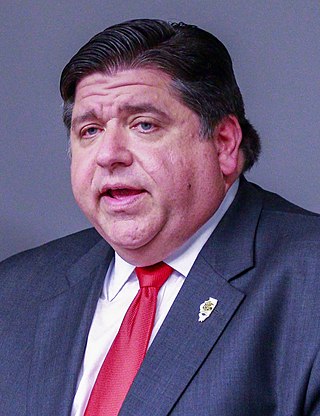
The governor of Illinois is the head of government of Illinois, and the various agencies and departments over which the officer has jurisdiction, as prescribed in the state constitution. It is a directly elected position, votes being cast by popular suffrage of residents of the state. The governor is responsible for enacting laws passed by the Illinois General Assembly. Illinois is one of 14 states that does not have a gubernatorial term-limit along with Connecticut, Idaho, Iowa, Massachusetts, Minnesota, New York, North Dakota, Texas, Utah, Washington, Wisconsin, District of Columbia, Vermont, New Hampshire and Puerto Rico. The governor is commander-in-chief of the state's land, air and sea forces when they are in state service.

Ninian Edwards was a founding political figure of the State of Illinois. He served as the first and only governor of the Illinois Territory from 1809 to until the territory was dissolved in 1818. He was then one of the first two United States senators from the State of Illinois from 1818 to 1824, and the third Governor of Illinois from 1826 to 1830. In a time and place where personal coalitions were more influential than parties, Edwards led one of the two main factions in frontier Illinois politics.

The Illinois House of Representatives is the lower house of the Illinois General Assembly. The body was created by the first Illinois Constitution adopted in 1818. The House under the current constitution as amended in 1980 consists of 118 representatives elected from individual legislative districts for two-year terms with no limits; redistricted every 10 years, based on the 2010 U.S. census each representative represents approximately 108,734 people.
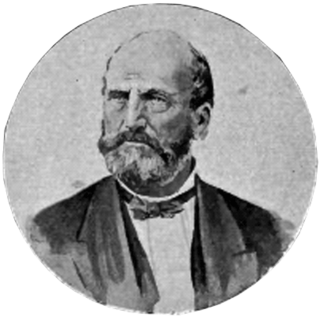
Joel Aldrich Matteson was the tenth Governor of Illinois, serving from 1853 to 1857.

The Illinois State Capitol, located in Springfield, Illinois, houses the legislative and executive branches of the government of the U.S. state of Illinois. The current building is the sixth to serve as the capitol building since Illinois was admitted to the United States in 1818. Built in the architectural styles of the French Renaissance and Italianate, it was designed by Cochrane and Garnsey, an architecture and design firm based in Chicago. Ground was broken for the new capitol on March 11, 1868, and the building was completed twenty years later for a total cost of $4.5 million.

Joseph Duncan was an Illinois politician. He served as the sixth Governor of Illinois from 1834 to 1838, the only Whig to ever govern the state. Before becoming governor he served four terms in the United States House of Representatives as a Democrat.
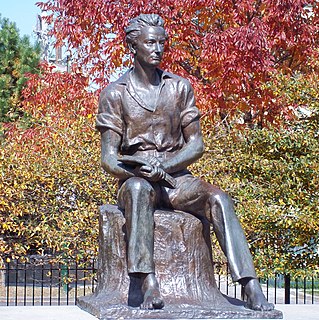
Abraham Lincoln was born on February 12, 1809, in a one-room log cabin on the Sinking Spring farm, south of Hodgenville in Hardin County, Kentucky. His siblings were Sarah Lincoln Grigsby and Thomas Lincoln, Jr. After a land title dispute forced the family to leave in 1811, they relocated to Knob Creek farm, eight miles to the north. By 1814, Thomas Lincoln, Abraham's father, had lost most of his land in Kentucky in legal disputes over land titles. In 1816, Thomas and Nancy Lincoln, their nine-year-old daughter Sarah, and seven-year-old Abraham moved to what became Indiana, where they settled in Hurricane Township, Perry County, Indiana.
The Beardstown and Sangamon Canal was a canal plan developed in the mid-1830s, with avid backing by Abraham Lincoln, then an Illinois state legislator, to make large portions of the Sangamon River between Springfield, Illinois, and Beardstown, Illinois, navigable via a canal to the junction with the Illinois River, which in turn flows into the Mississippi River.
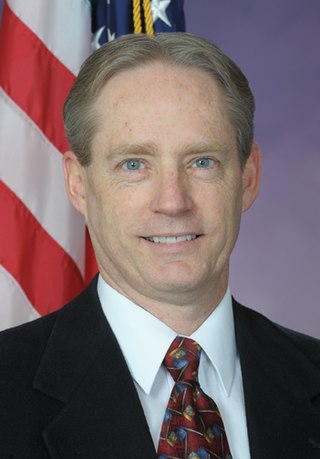
Thomas George is an American physician and politician from the U.S. state of Michigan. As a Republican member of the Michigan State Senate, he represented Kalamazoo County as well as an eastern portion of Van Buren County. George is a physician and former medical director for Hospice of Greater Kalamazoo. He is currently the co-chairman of the Department of Anesthesiology at Western Michigan University's Homer Stryker School of Medicine.
James D. Henry was a militia officer from the U.S. state of Illinois who rose to the rank of general during the Black Hawk War. Henry was born in Pennsylvania in 1797, and moved to Edwardsville, Illinois in 1822. In 1825, while living in Edwardsville, he was indicted with two other men for the murder of an acquaintance, though he never went to trial. One defendant was tried but found not guilty, and following the trial Henry moved to Springfield, Illinois, where he was elected sheriff. When the Winnebago War broke out in 1827 Henry acted as adjutant for four companies of volunteers.

This is the electoral history of Abraham Lincoln. Lincoln served one term in the United States House of Representatives from Illinois (1847–1849). He later served as the 16th president of the United States (1861–1865).
The 1852–53 United States Senate elections were elections which had the Democratic Party gain two seats in the United States Senate, and which coincided with the 1852 presidential election. Only six of the twenty senators up for election were re-elected.

The 1858–59 United States Senate elections were elections which had the Republican Party gain five additional seats in the United States Senate, but the Democrats retained their majority. That majority would erode in 1860 with the secession of the southern states leading up to the Civil War.
The 1860–61 United States Senate elections were elections corresponding with Abraham Lincoln's election to the presidency. The nascent Republican Party increased their Senate seats in the regular elections, and after southern Democrats withdrew to join the Confederacy, Republicans gained control of the United States Senate. To establish a quorum with fewer members, a lower total seat number was taken into account.
Jesse Kilgore Dubois was an American politician from Illinois. The son of a prominent early Illinois citizen, Dubois was elected to the Illinois House of Representatives while he was attending Indiana College. Nicknamed Uncle Jesse, he served four two-year terms there. An early Republican, Dubois was named the party's first candidate for Auditor of Public Accounts. He was elected in 1856 and served two four-year terms. He was the father of Senator Fred Dubois.

The 1918 United States Senate election in Michigan took place on November 5, 1918. Incumbent Republican Senator William Alden Smith did not seek re-election to a third term in office. In the race to succeed him, Republican former Secretary of the Navy Truman Handy Newberry defeated the automobile industrialist Henry Ford. Ford first challenged Newberry in the Republican primary and lost and then faced Newberry again, running as the Democratic nominee in the general election.
Steve McClure is a Republican member of the Illinois Senate for the 50th District who serves as Assistant Leader and Assistant Floor Leader for the Senate Republican Caucus. The 50th District, located in Central Illinois, includes all of Calhoun, Greene, Morgan, Pike, and Scott counties as well as portions of Macoupin, Madison, Jersey, and Sangamon counties. Before his election to the Illinois State Senate, McClure was a prosecutor for nearly six years in the Sangamon County State's Attorney's Office in Springfield, Illinois where he was chief of the Juvenile Division, and later served in the Felony Division.
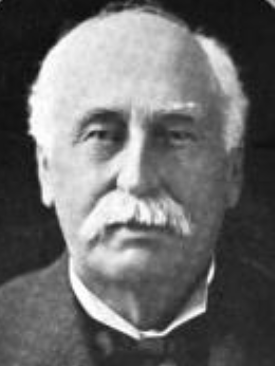
Roswell Eaton Goodell was a politician and businessman who served in several political positions.
The Macalister-Stebbins Bond Fraud was a financial scandal that occurred in the State of Illinois in 1859. While investigating the Canal Scrip Fraud, the State Senate Finance Committee discovered that a special class of bonds the state had issued in 1841 had been improperly redeemed. The bonds were known as the Macalister-Stebbins bonds after the bankers who had sold them on behalf of the state. The bonds had been issued during the state's financial crisis to pay interest that the state owed on other obligations. The bonds carried a face value of $1,000, but at auction had only sold for an average of $286. When the bonds came due in 1849, the state devalued them, agreeing to pay only $286 plus interest.
References
- 1 2 3 George, Tom M. (Fall 2021). "Lincoln and the First Corruption of Illinois". Journal of the Abraham Lincoln Association. 42 (2): 1–25 – via University of Michigan.
- ↑ Lamb, John M. (November 1977). "The Great Canal Scrip Fraud" (PDF). The Magazine of Illinois. 16 (9): 57–60.
- ↑ Journal of the Senate of the Twenty-First General Assembly of the State of Illinois. Springfield: Bailhache & Baker. 1859.
- ↑ The Great Canal Scrip Fraud. Minutes of Proceedings, and Report of Evidence in the Investigation of the Case, By the Grand Jury of Sangamon County, ILL, at the April Term of the Court of Said County, 1859, Ordered to be Published by a Vote of the Grand Jury. Springfield: Daily Journal Steam Press. 1859.